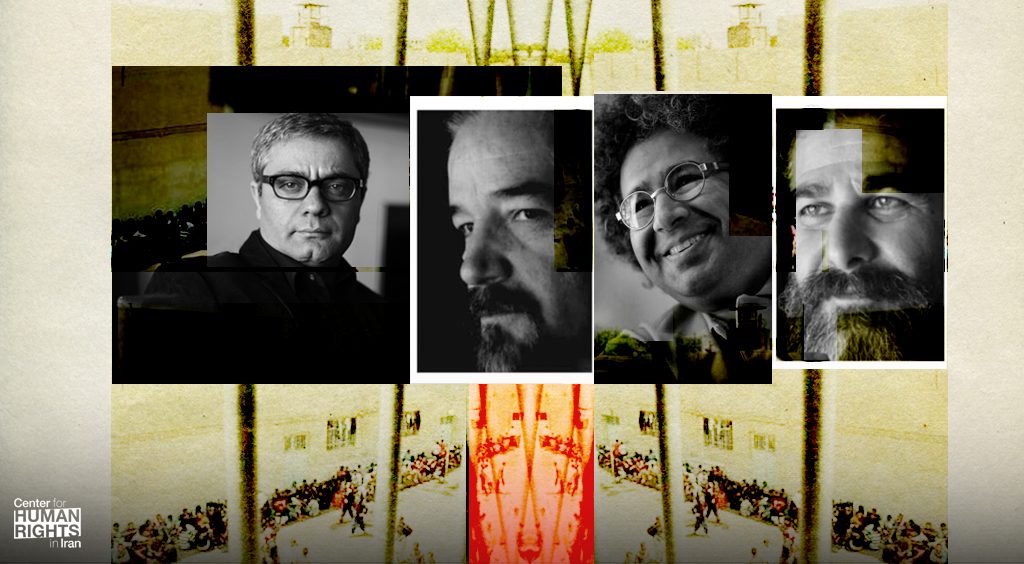“They Want to Create Fear” More Artists Summoned to Prison Amid Iran’s Rising COVID-19 Death Toll
 In addition to renowned filmmaker Mohammad Rasoulof, three members of the Iranian Writers Association (IWA)—Baktash Abtin, Reza Khandan Mahabadi and Keyvan Bajan—have been summoned to prison as other inmates are being reportedly released to prevent more COVID-19 outbreaks, the Center for Human Rights in Iran (CHRI) has learned.
In addition to renowned filmmaker Mohammad Rasoulof, three members of the Iranian Writers Association (IWA)—Baktash Abtin, Reza Khandan Mahabadi and Keyvan Bajan—have been summoned to prison as other inmates are being reportedly released to prevent more COVID-19 outbreaks, the Center for Human Rights in Iran (CHRI) has learned.
“I’m sure it upsets them very much that I made a new film without their permission,” said Rasoulof in an interview with CHRI. “But it would be very childish for them to enforce a sentence in the middle of all these problems they’re facing with the spread of the coronavirus.”
“The regime is unpredictable to me,” added the independent director. “I can’t believe they will enforce the sentence nor am I sure they won’t. They have reacted very strangely in various situations. But my general decision is not to report to prison.”
Rasoulof was summoned to Tehran’s Evin Prison in early March to serve a one-year prison sentence for the charge of “propaganda against the state” one week after his film about capital punishment, “There is No Evil, won the top prize at the Berinale – Berlin International Film Festival.
In May 2019, Branch 26 of the Revolutionary Court in Tehran presided by Judge Mohammad Moghiseh sentenced the three IWA members to six years prison each on charges of “propaganda against the state” and “assembly and collusion against national security” for peaceful actions including publishing documents about the IWA’s history and organizing memorial ceremonies for IWA members who’d been killed by state agents in the 1990s.
In December 2019, Branch 36 of Iran’s Appeals Court upheld the sentences against Abtin and Mahabadi and reduced Bajan’s sentence to three years and six months but they remained at home with the sentences hanging over their heads, as is often the case with political prisoners in Iran.
“They have asked us to report to Evin Prison within five days; I will not report to prison in these circumstances,” Abtin told CHRI on March 11, 2020, referring to Iran’s deadly COVID-19 outbreakthat has reportedly reached prisons throughout the country. “I will wait for them to come and arrest me.”
“I cannot think of one logical reason why, under these chaotic conditions, we wouldn’t be considered dangerous for other prisoners,” he added. “We in the outside world could be carrying this disease.”
Abtin continued: “We have rarely seen the regime acting wisely… and if we want to look at this from a cynical point of view, by sending us to prison under these circumstances the regime wants to liquidate people like us so that we die naturally in prison without having our blood directly on their hands.”
Abtin’s colleague Keyvan Bajan said they were being targeted to scare other citizens from engaging in peaceful activities that could be interpreted as criticism of state policies, such as freedom of speech and expression.
“They want to create fear and terror,” he told CHRI. “The issue is that there was no need for them to enforce our sentences at this time. We were sentenced a long time ago and they could have waited a couple of more months, given the present health situation in the prisons.”
“I was really surprised by their action especially when the judiciary chief ordered a temporary suspension of sentences [for other prisoners],” he added, noting that he would be consulting with his lawyer about what to do next.
Reza Khandan Mahabadi told CHRI he couldn’t figure out the logic of summoning them to prison as thousands of prisoners were being released due to a widening health crisis.
“We can’t really understand what the authorities are up to,” Mahabadi told CHRI. “Are they just carrying out their work and enforcing an old sentence under normal procedures without thinking of the circumstances, or is the judiciary chief trying to exert his power by telling us he will enforce sentences regardless of his order to grant furloughs?”
He added: “If this isn’t normal procedure, it can be a sort of show of force to create fear. They have always relied on creating fear… Otherwise it doesn’t make any sense to enforce sentences at a time when disease is spreading. We on the outside could be carrying the disease and pose a danger to prisoners. I haven’t made a firm decision about what to do but I believe this summons to be wrong.”






